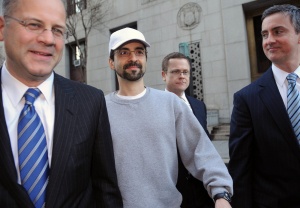Sergey Aleynikov
| Birthname | Sergey Aleynikov |
| Date of Birth | February 23, 1972 |
| Birth Place | Soviet Union |
| Nationality | Russian, American |
| Occupation | Computer Programmer and Software Architect |
| Biography | Russian-American computer programmer accused of violating trade-secret protection laws. |

Sergey Aleynikov is a Russian-American computer programmer who is currently the defendant in a series of lawsuits alleging that he stole computer code from his former employer, Goldman Sachs. While employed as a Vice-President of Equity Strategy at Goldman Sachs in New York City between 2007 and 2009, Aleynikov developed the firm's high-frequency trading (HFT) systems in the Direct Private Investing division.
In May, 2009 he received and accepted an offer from a competing HFT firm, Teza Technologies.[2] Before leaving his position at Goldman Sachs in June of 2009, he created personal copies of source code from Goldman Sachs information technology infrastructure.[3] He was subsequently convicted twice of crimes related to his intentional duplication of Goldman Sachs' code, has served time in prison for the alleged theft, [4], and is currently free on appeal of his most recent conviction. His career in the financial HFT field and the legal battle which followed his tenure at Goldman Sachs inspired the book Flash Boys.
Early Life
Aleynikov was born to a Russian Jewish family of academics. Before attending the Moscow Institute of Transportation Engineering,[5] he first used a computer at age sixteen and became fascinated by writing computer programs. He wished to study Computer Science during his undergraduate term, but was prevented from doing so by Soviet authorities on account of his semitism. He was only allowed to study mathematics.[6]
Emigration to the U.S.
Before finishing his degree in Moscow, he became frustrated that he was not permitted to pursue his interest and concerned by the political climate in Moscow. He decided to emigrate to the United States shortly before the collapse of the Soviet Union and arrived in New York City in mid-1990. He would later become a naturalized U.S. citizen.[7] He sought employment in New York City and eventually found a position as a programmer at a New Jersey Medical Imaging clinic.[5] He soon moved to a position as a teacher's assistant in the Rutgers University computer science department [8] where he completed first a Bachelor degree in computer science and then a Master of Science degree, both concurrent with his employment.
Professional Career
Early Career
Upon completing his Master's degree in 1996, he took a sequence of positions working as a software engineer for internet companies. In 1998, he took a role at a New Jersey-based telecommunications company, IDT Corporation. He spent nearly nine years working as a Director and Lead Engineer in IDT's Research and Development division, improving the logic used to route voice calls through telephone lines.[5]
Transition to Wall Street
A recruiter for Wall Street financial firms contacted Aleynikov in 2006 in attempt to convince Aleynikov to apply for algorithmic stock trading positions. The recruiter believed Aleynikov was a good candidate because of Aleynikov's extensive experience working with low-latency systems like the IDT's voice call routing system which mirrored the technical challenges of algorithmic trading. Aleynikov was initially disinterested in the nature of the work, but agreed in 2007 to interview with Goldman Sachs when he became concerned about the state of IDT's management and needed additional income to fund the purchase of a larger home for his family.[6] After completing several rounds of interviews, he accepted an offer for a position as a Vice-President of Equity Strategy in May, 2007.[6][5]
Departure from Goldman Sachs
During his tenure at Goldman Sachs, he made several observations about the environment he worked in which he would later recount in Flash Boys. First, he was confused by his managers' stance on Open Source Software. He was encouraged to use code which had been published online in code he wrote for Goldman's trading systems, however when he asked for permission to publish his improvements to open source libraries, he was denied the opportunity. He perceived that his managers saw the improved code -- independent of the bank-specific code Aleynikov had added -- as property of the bank where he saw it as public property. Similarly, he saw the existing code the bank maintained to be, in his words, "an elephant." He felt that he was constantly fixing small problems on a huge project rather than creating new and original code. Finally, he noted that, “essentially there was very minimal connections between people," and that the bank provided an environment of isolation to its programmers.[6]
Teza Technologies Offer
When he received an offer for a move to Teza Technologies, a Chicago-based hedge fund, in April of 2009, he was excited about the chance to build a trading platform from nothing. He accepted the offer which tripled his Goldman Sachs salary [9] and handed in his resignation from his role at the bank, agreeing to remain in the office for six weeks to ease the transition of his replacements.
Alleged Crime
During the final six weeks of his time at Goldman Sachs, the FBI alleged that Aleynikov logged on to a Goldman computer system four times to duplicate parts of the bank's proprietary HFT codebase.[3]
Per the testimony of Michael G. McSwain, the lead investigator in the FBI case which followed Aleynikov's departure from Goldman Sachs, Aleynikov sent these copies to himself via email and that, in his final several days of employment, once uploaded 32 megabytes of source code to online software version servers to make the code accessible after his departure from the bank.[3] Aleynikov has stated that he meant to keep a copy of just small sections of open source code he had previously utilized for later reference and did not intend to copy any proprietary logic.[6]
McSwain's deposition also alleged that Aleynikov deleted the command-line log files on his Goldman-provided computer after he transferred code to an external web server. Aleynikov admitted in a written confession that he both removed these records[9] and knew that his employer "wouldn't be happy about it," but defends his actions by pointing out that he wished to protect his internet passwords which could be exposed by the log files. He stated that deleting the log files "felt like speeding. Speeding in the car." [6]
Prosecution
Detection of the Crime
...
Arrest
With a complaint lodged by Goldman Sachs' security department in hand, the FBI arrested Aleynikov on July 3, 2009 as he stepped off an airplane at Newark International Airport.[10]
Precedent
The case of US vs. Agrawal provides the most similar legal case to Aleynikov's, however it began in 2010, well after Aleynikov's arrest.
Federal Case
He was ultimately acquitted formally on June 5, 2012 on two counts.[11]
New York State Case
...
Current State of Litigation

A Delaware legal brief revealed that Aleynikov accrued nearly $7 million in legal costs through 2015, of which he has paid less than $600,000.[12]
Controversial Status as a Goldman Sachs Officer
As well as soliciting donations from the public to his defense fund, Aleynikov has sought funds to retain his defense team from Goldman Sachs itself. The bank's own by-laws, at the time of Aleynikov's arrest, dictated that the firm would pay the legal fees of any of its "officers" who were brought to court over their capacity in the firm. This policy obligated Goldman Sachs to pay for Aleynikov's defense across his various trials.
The debate now hinges on the definition of an "officer." Goldman Sachs submits that Aleynikov received neither the perks nor responsibilities of other corporate officers, even though he held the title of Vice President, and therefore should not be entitled to renumeration of his legal fees by the firm. Aleynikov opposes this position; “I was given the title of VP. That indicated to me that I was an officer,” regardless of other perks and responsibilities.[12]
While a New Jersey court at one point ordered Goldman Sachs to pay a sum of $2.3 million to Aleynikov's defense team, that ruling was subsequently overturned. A similar debate continues in a Delaware court with a $550,000 liability at stake.[12]
Aleynikov's Countersuit
Aleynikov and his defense team have alleged that the Department of Justice maliciously encouraged New York State Prosecutors to move against Aleynikov following his acquittal in the federal case in order to punish him for his alleged crime. He states on his defense website, "I strongly believe that this second prosecution was a vindictive action by government against me in their attempt to punish me even further based on a wrongful allegation of a crime I didn't commit."[13]
Ethical Analysis
...
References
- ↑ Kravets, David. "Goldman Sachs Code-Theft Conviction Reversed." Wired. Conde Nast, 17 Feb. 2012. Web. https://www.wired.com/2012/02/code-theft-conviction-reversed/
- ↑ Feeley, Jef. "Goldman's Army of VPs Draws Scrutiny in Aleynikov Fee Fight." Bloomberg.com. Bloomberg, 28 Apr. 2016. Web. https://www.bloomberg.com/news/articles/2016-04-28/goldman-aleynikov-fee-fight-turns-on-wall-street-vp-inflation
- ↑ 3.0 3.1 3.2 Deposition of Michael G. McSwain. United States Magistrate Judge. Southern District of New York. Scribd. By Joseph P. Facciponti. Assistant United States Attorney General, 4 July 2009. Web. https://www.scribd.com/doc/17118166/Complaint-Aleynikov
- ↑ Levine, Matt. "Goldman Coder Goes Free, But Insider Trader Stays in Jail." Bloomberg.com. Bloomberg, 07 July 2015. Web. https://www.bloomberg.com/view/articles/2015-07-07/goldman-coder-goes-free-but-insider-trader-stays-in-jail
- ↑ 5.0 5.1 5.2 5.3 Sergey Aleynikov LinkedIn Profile https://www.linkedin.com/in/aleynikov/
- ↑ 6.0 6.1 6.2 6.3 6.4 6.5 Lewis, Michael (2014). Flash Boys: Cracking the Money Code. London, UK: Allen Lane. ISBN 9780241003633
- ↑ Zetter, Kim. "Code Not Physical Property, Court Rules in Goldman Sachs Espionage Case." Wired. Conde Nast, 11 Apr. 2012. Web. https://www.wired.com/2012/04/code-not-physical-property/
- ↑ Clark, Andrew. "Goldman Grabs Hi-tech Hacker." The Observer. Guardian News and Media, 11 July 2009. Web. https://www.theguardian.com/business/2009/jul/12/goldman-sachs-sergey-aleynikov
- ↑ 9.0 9.1 What's The Deal With That Goldman Sachs Programmer? http://www.npr.org/sections/money/2009/07/whats_the_deal_with_that_goldm.html
- ↑ United States. United States Attorney. Public Information Office. U.S. Department of Justive. By Yusill Scribner and Rebekah Carmichael. U.S. Federal Government, 11 Feb. 2010. Web. https://www.justice.gov/archive/usao/nys/pressreleases/February10/aleynikovsergeyindictmentpr.pdf
- ↑ United States Distrcit Court Judgement of Acquittal https://docs.google.com/a/aleynikov.org/viewer?a=v&pid=sites&srcid=YWxleW5pa292Lm9yZ3x3d3d8Z3g6N2IzMzM5NTExNmU1ZTAwNg
- ↑ 12.0 12.1 12.2 Feeley, Jef. "Goldman's Army of VPs Draws Scrutiny in Aleynikov Fee Fight." Bloomberg.com. Bloomberg, 28 Apr. 2016. Web. https://www.bloomberg.com/news/articles/2016-04-28/goldman-aleynikov-fee-fight-turns-on-wall-street-vp-inflation
- ↑ Aleynikov Legal Defense Site http://www.aleynikov.org/

